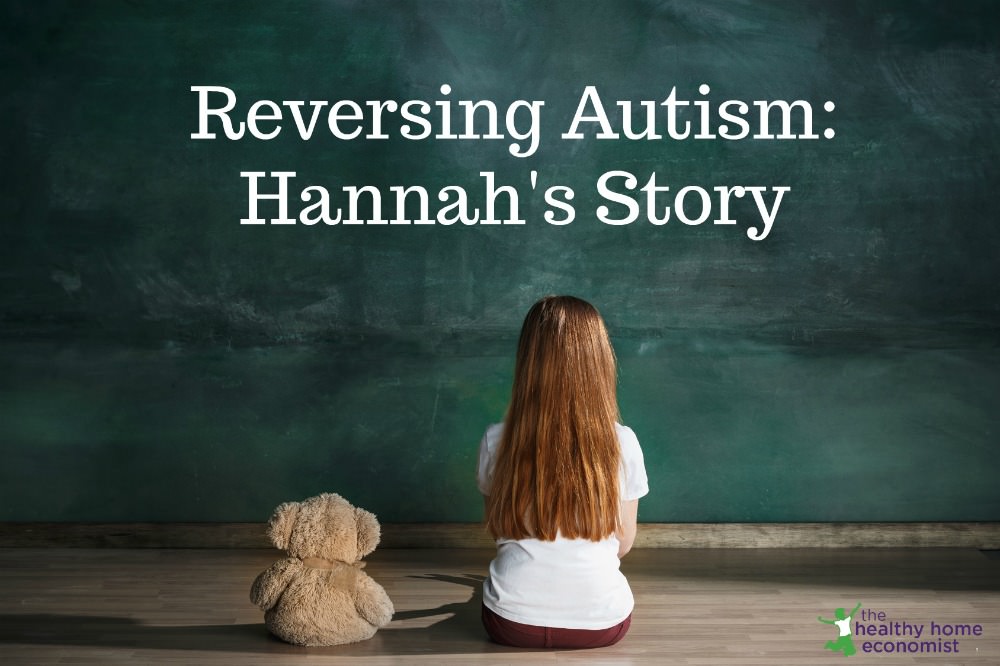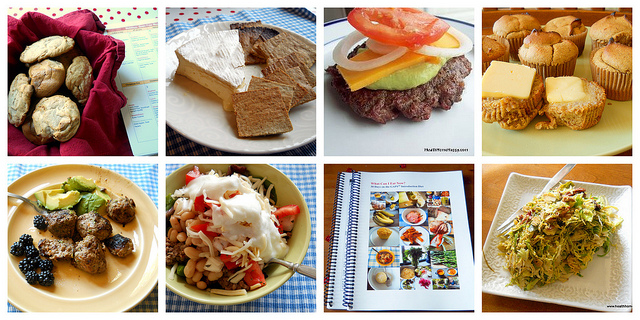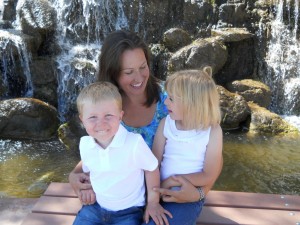How the GAPS Diet reversed symptoms of autism in just two years in a young girl who is no longer on the spectrum and living a normal childhood.
I knew my daughter Hannah had autism when she was only 12 months old although she wasn’t professionally diagnosed until age 4.
Now at 6 years old, after being on the GAPS Diet for 2 1/2 years, Hannah no longer carries an autism diagnosis and the progress she has made has been nothing short of life changing.
What’s more, Hannah has successfully transitioned off of GAPS in recent months and is now eating a normal traditional diet which includes grains and starches – with no regression or recurrence of symptoms!
For those of you new to GAPS, it stands for Gut and Psychology Syndrome. GAPS is a temporary diet that was designed by Dr. Natasha Campbell-McBride MD to reverse autism in her own son. GAPS works to heal the gut lining, rebalance intestinal flora, and help with nutrient absorption.
In a nutshell, the GAPS Diet cuts out grains, sugar, and starch, and adds in foods rich in probiotics, healthy fats, and amino acids needed to heal and seal the gut wall. Once the gut lining is healed, many chronic health problems magically go away- things from autoimmune diseases to behavior problems to eczema.
Yes, even autism!
Hannah’s Story of Reversing Autism
I had been keeping an eye on Hannah’s development from 4 months old when she wasn’t making eye contact, rolling over, or interested in anything other than nursing, I knew something was up, but it was right near her 1st birthday that I looked up the diagnostic criteria for autism, and realized that yes, she most likely did qualify as autistic, though most professionals won’t diagnose it until 3 years. It wasn’t until she was 4 that she received a formal diagnosis from a professional, but I knew I needed to start intervention as soon as possible in order to give her the greatest chance for a full recovery.
I started by keeping her on a Weston A. Price Traditional Diet of all organic, nutrient dense foods as she was weaning, but when I didn’t see improvement with that we tried the gluten free casein free diet, which helped her ability to learn temporarily. After awhile, however, she lapsed back into ‘autism land’.
As a desperate young mom with an autistic toddler, and now her infant baby brother, I continued to search for ways to help my child. Googling ‘what to do when the gluten free casein free diet stops working autism’ brought up the GAPS Diet – this was 2009 when GAPS was just beginning to be known across the internet.
It took me a few months to work up the motivation to place my small child on such a restrictive diet, but the waking up every 2 hours all night every night, her not making progress in speech or occupational therapy because she was unable to learn, and wanting so desperately to improve her quality of life pushed me to give GAPS a try. Just after Hannah’s 3rd birthday I said we would only try GAPS for 30 days. And I tried it with her, to make sure I felt okay on such a different diet than typical Americans eat.

Starting GAPS
We started GAPS with the intro diet in November 2009. I saw such great progress with her (and myself- GAPS cleared up a dairy allergy that I’d had since childhood, in just 6 weeks of the intro diet!) that I committed to keep going.
She was able to learn again, and seemed to be starved for GAPS food; she was actually eating more than I was as a lactating mother!
Continuing GAPS as it was needed
We continued GAPS for 2-1/2 years, working to heal the gut lining. Hannah’s digestion improved, and she started eating less after having been on the diet for a few weeks- her body was so starved for nutrients at first that she would eat everything in sight, but slowed back down to a typical toddler amount after a few weeks on GAPS.
The most exciting part of Hannah’s improvement on GAPS was that she was once again able to learn. She started making progress in speech, occupational, and physical therapies. She took an interest in other children, was sleeping well at night, and was happier during the day. GAPS gave her quality of life so much improvement, that there was no question that we had to continue the diet as long as it helped her.
As we continued, I got better at cooking GAPS food. In the beginning we ate vegetable soup, cooked chicken, hamburgers, and scrambled eggs nearly every day. GAPS forced me to be more creative with the allowed GAPS food, and I was able to expand to very enjoyable meals!
Hannah knew her diet was different, but she was content with her food. Other parents would look on at me jealously as she gobbled up eggs, meat, fruit, and veggies. The diet took effort to continue with, but once we had been on it about 6 months it just became routine.
Transitioning off the GAPS diet after 2 years
GAPS is intended to be a temporary diet, so after Hannah had been on it and doing well for 2 years, I started trying some foods that weren’t GAPS legal about once a month. We started with potatoes, popcorn, and whole raw milk and she did well. We continued introducing new non-GAPS foods and watched carefully for any reactions (wheat was the last thing we introduced). If her gut wasn’t healed enough to tolerate a food I saw reactions in the form of skin rashes, night terrors, or loss of eye contact- every person’s reactions would be different though.
In June we traveled to California for my little brother’s wedding. She had been transitioning off GAPS for 6 months by then, so I decided to just let go and see if she could eat what everyone else was eating. She did great! No reactions to the food at all. We were officially and successfully done with our GAPS and food allergy journey!
No longer Autistic!
Though Hannah still has some learning disabilities (I believe this is from the long time that her brain was bombarded with toxins pre-GAPS, and we’re trying other therapies to continue to help with this), she just was tested this fall and no longer meets the criteria needed for an autism diagnosis.
She has benefited so much from the GAPS diet, and has come so far from the 12 month old who would just fuss or stare off into space all day. She is toilet trained, loves interacting with peers, talks, learns new things, makes great eye contact, and is getting much better at accepting changes to her routine.
We still eat mostly GAPS at home, since it is such a nutrient dense diet that our whole family thrives on. But being off GAPS means that I don’t have to stress when we’re out and we can just eat what everyone else is eating.
The GAPS diet has been amazing for our family, I am so thankful that Dr. Natasha Campbell-McBride wrote the GAPS book in time to help Hannah. I’m also thankful it’s not a diet we have to be on for life, but it was so worth it to stick with it for the couple years we needed to be on it.
About Cara
 I’m Cara, and I write at Health, Home, and Happiness. Because I was so overwhelmed when starting the GAPS Diet, I put together some resources to help others who want to do GAPS.
I’m Cara, and I write at Health, Home, and Happiness. Because I was so overwhelmed when starting the GAPS Diet, I put together some resources to help others who want to do GAPS.
I have GAPS friendly meal plans (full GAPS), a book that helps you get through the more strict Introduction Diet, and even a guide to help you stock your freezer with GAPS friendly foods.
More Information on the GAPS Diet
GAPS Diet: Heal Your Autoimmune Disease Now
Overwhelmed by the GAPS Diet? Help Has Arrived
How to Speed Healing and Shorten Time on the GAPS Diet
The Five Most Common GAPS Diet Mistakes
GAPS Diet Heals Ulcerative Colitis
5 Steps to Healing IBS Naturally
FPIES: Resolving the “Other” Food Allergy
Chronic Stomach Pain and Bloating Gone!








Does anyone here know anyone who is chronicling all of these “anecdotal” transformations? I think any person who values holistic approaches who has an autistic loved one would LOVE to have access to all of the different things people have tried, and how the progress looked, what the particular challenges were, etc. I would LOVE to be introduced to anyone chronicling such reported experiences.
LOVE this story (and all of your stories)! I’ve known of the GAPS Diet for a number of years and have been digging into it more and more as I’ve read more and more stories (and heard about more and more stories). So glad it’s getting such positive feedback!
Lindsey Atkinson Lillywhite Yes, any sort of neurological challenges are greatly helped by GAPS.
I had been diagnosed as being autistic at 3 years of age and, while greatly improved, I can no longer make it to the world on my own; but I’m doing quite well now that I’m working part-time two days a week.
We’ve been doing it for my daughter who has a type of autism called Asperger syndrome. Turns out she’s gluten intolerant (little surprise now that we know I’m Celiac) so the diet improved some of her cognitive symptoms but she is still most definitely autistic. Autism is a neurological disorder that is largely genetic, so my guess would be that this girl simply had severe food allergies/intolerances and was never autistic, or more likely she is still autistic and is high functioning enough to fly under the radar. Autism doesn’t just “go away”. Girls especially slip under the radar because they internalize many of their difficulties and present with symptoms outside the classical ones. My own daughter wasn’t diagnosed until age SEVEN because of atypical symptoms, high intelligence, and good mimic skills. The mother says she still has learning disabilites, still hasn’t fully mastered handling routine changes. I’m not trying to be negative here, and it’s so wonderful the girl has improved so much, but I suspect strongly that she is still autistic and that this may cause difficulties later on for her, when social interaction with peers becomes more nuanced and quirks will be much more visible. It isn’t necessarily a bad thing to be high-functioning autistic, but I feel like Mom might be in a bit of denial, and the doctor evaluating is missing things because girl children present symptoms differently. GAPS did not cure my daughter of autism. It did make her much healthier however, which improves anyone’s functioning.
Hi! Not in denial at all 🙂 She may be high functioning autistic, we recently had an evaluation done and she doesn’t meet the DSM-IV criteria for autism diagnosis, so we’re leaving it at that. She did meet the criteria at 4.
I still tell people ‘she has autism’ occasionally just because she has spectrum-ish quirks and that’s the easiest way to explain it without going into her whole history.
I’m most excited that the changes we made while on GAPS ‘stuck’ when we transitioned off. Pre-GAPS really all she did was pour things in buckets, open and close doors, and nurse. She *learns* new things now, it’s slower, but she’s learning and can eat a less restrictive diet <3
I agree… I think once someone is born with a disability you can’t “cure” it, make it tolerable yes, even to the point of almost not there, but being born with it I think it will always be there. I too think the mom is in off on saying it reversed autism. With the “problems” she says the daughter still has. I’m not saying the diet isn’t good and benificial, any “healing” nutritional way of eating is good, the problem comes from one being born with a disability of the brain. Children who may have gotten autism from vaccines is different, yes I believe (with all the studying and research) you can reverse that. I do believe that is what happened to dr Natasha’s son.
What you are clearly not grasping is that this mother and daughter are under the care of specialists who tested her for autism. She no longer meets the criteria to be considered autistic. She didn’t just pull this out of thin air.
Don’t be jealous of this woman’s commitment and success. If you or someone you love is struggling, you and they can heal.
Autism can be reversed. So can many other illnesses. Doctor’s heal people of these ailments every day by addressing toxicity, allergies, gut issues, and infections. It’s not a disability of the brain, its toxic overload which gives symptoms to brain. And vaccines are not the entire cause, they are just more toxins that add to it and may cause symptoms to begin.
Love reading about pro active parents who search and find ways to address these ailments to find true healing.
Go Hannah!
I was lucky enough to attend Dr. Campbell-McBride’s full day seminar — and I read her book. I remember her saying that the time needed to fully heal varies and a BIG determinant of that is how long the gut has been ailing. It seems fully possible – probable even – that if Cara started dietary intervention in the toddler years, autism could be reversed. Is a “full recovery” possible later in life? Possibly. Will it take more than two years of strict GAPS diet? Likely. But don’t give up.
I do not believe diseases just happen randomly and that we are always stuck with them. Cara can probably identify some of the things that contributed to her daughter’s poor gut and thus autism (a Gut and Psychology Syndrome). Her child is now “delayed” because the brain goes through a critical learning-to-learn phase from 2-6. Her child has missed some of that due to the autism cloud. With it lifted, she will progress in her own way. She will likely have challenges and have to find different ways of learning. But that isn’t autism.
Kudos to Cara for believing whole-heartedly in our bodies’ amazing capability to heal. I have seen this miracle time and time again. What a gift these glorious machines are we live in.
Exactly! I’ve heard of some kids going from autistic to totally typical on GAPS, and that’s awesome, but it didn’t happen for us. In our last testing she scored the same percentile as she did a year ago, which means that she is now learning (testing compares her to typically developing peers of her same age, so it gets progressively harder with age) and not falling further behind. Before GAPS she was falling further behind each time she was tested. (if this makes sense, it was kind of difficult for me to understand at first too)
I’m still pursuing more alternative therapies to see if we can help her to catch up faster, but if she can’t, that’s ok too.
There is a book call The Myth of Autism by Dr. Michael Goldberg, that is worth reading if you are interested in this. He points out that an autism ‘epidemic’ cannot be genetic. He says it is a treatable neurological disease. He has a system for treatment called the Goldberg Approach. The book has pictures of children’s brains before and after treatment. I highly recommend this book to anyone learning about or dealing with autism spectrum issues.
I used to think Autism (as well as autoimmune diseases and mental illnesses) couldn’t be cured either until I read the GAPS book and saw people I actually know use the diet to reverse chronic diseases considered incurable. More and more evidence is suggestiong the microbiome/autism connection. huffingtonpost.com/john-rodakis/autism-causes_b_7172616.html
Some years back (had never heard of the GAPS diet at the time), we did the SCD diet (strictly for about 3 years), which is very similar to GAPS. It helped (cured, really) my son’s digestive issues and a few of his Autistic symptoms, but he is still very Autistic (he’s 14 now). We’ve tried MANY things that have worked for other kids that have either helped our son only very little, or not at all. But I’m certainly not trying to discourage parents from trying things that have worked for other kids, because you know what they say, “If you’ve met one Autistic kid, you’ve met ONE Autistic kid.” So just because something works for one kid doesn’t mean it will work for another, but you’ll never know if you don’t try.
I just recall all the times I was overly optimistic regarding one intervention or another, only to be so disappointed and discouraged when my son didn’t respond at all. So by all means be optimistic, but be cautiously optimistic. On a side note — had it not been for our son’s Autism, my husband and I might not be where we are today with regard to healthy eating. From food, to medicine, to politics and just ‘outside the box’ thinking in general, our way of thinking has changed drastically, for the better. But I’d gladly give up all that knowledge if someone could take away his Autism, of course.
Great story, thanks for sharing!
Best nutritional healing book & diet ever!!!
Wow what an encouraging story!!